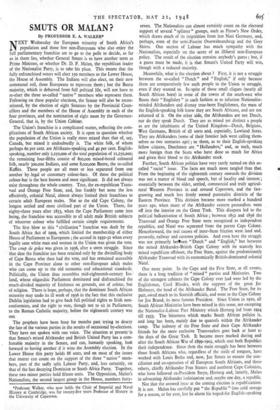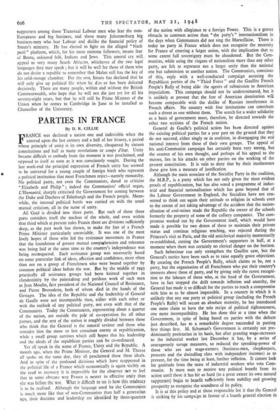SMUTS OR MALAN ?
By PROFESSOR E. A. WALKER* NEXT Wednesday the European minority of South Africa's population and those few non-Europeans who also enjoy the full parliamentary franchise are to go to the polls to decide, as far as in them lies, whether General Smuts is to have another term as Prime Minister, or whether Dr. D. F. Maim; the republican leader of the Nationalist Party, is to take his place. This means that the fully enfranchised voters will elect 15o members to the Lower House, the House of Assembly. The Indians will also elect, on their new communal roll, three Europeans to represent them ; but the Bantu majority, which is debarred from full political life, will not have to re-elect the three so-called " native " members who represent them. Following on these popular elections, the Senate will also be recon- stituted, by the election of eight Senators by the Provincial Coun- cillors and the members of the House of Assembly in each of the four provinces, and the nomination of eight more by the Governor- General, that is, by the Union Cabinet.
The Union's franchise is a complicated matter, reflecting the com- plications of South African society. It is open to question whether the population of the Union is really more mixed than that of, say, Canada, but mixed it undoubtedly is. The white folk, of whom perhaps 6o per cent. are Afrikaans-speaking and 4o per cent. English- speaking, number only 2,250,000 of the total population of ri,25o,000; the remaining four-fifths consist of Soo,000 mixed-breed coloured folk, nearly 300,000 Indians, and some 8,000,000 Bantu, the so-called Kaffirs. These people are all more or less separated from one another by .legal or customary colour-bars. Of these the political colour-bar is the best known and most significant. It did not always exist throughout the whole country. True, the ex-republican Trans- vaal and Orange Free State, and, less frankly but none the less effectively, colonial Natal, almost always limited their franchises to certain adult European males. Not so the old Cape Colony, the longest settled and most civilised part of the Union. There, for eighty-three years after 1853, when the Cape Parliament came into being, the franchise was accessible to all adult male British subjects of whatever colour who fulfilled certain simple requirements.
The first blow to this "civilisation" franchise was dealt by the
South Africa Act of 1909, which limited the membership of either House of Parliament to Europeans ; the second in 193o-31 when every legally sane white man and woman in the Union was given the vote. The coup de grace was given in 1936, after a stern struggle. Since that date the franchise has been retained only by the dwindling body of Cape Bantu who then had the vote, and has remained accessible in the Cape Province alone to other non-European adult males who can come up to the old economic and educational standards._ Polititally, the Union thus resembles mid-eighteenth-century Ire-' land, whose oligarchic Parliament dominated and disfranchised the much-divided majority of Irishmen on grounds, not of colour, but of religion. There is hope, perhaps, that the dominant South African minority may undo its ill work of 1936 in the fact that this exclusive Dublin legislation had to give back full political rights to Irish non- conformists, and the right to vote, though not to sit in Parliament, to the Roman Catholic majority, before the eighteenth century was out
The prophets have been busy for months past trying to descry the fate of the various parties in the results of occasional by-elections. They have not spoken with one voice. The situation at present'is that Smuts's mixed Afrikander and British United Party has a com- fortable majority in the Senate, and can, humanly speaking, look forward to having another if it wins the Assembly election. In the Lower House this party holds 88 seats, and on most of the issues that matter can count on the support of the three " native" mem- bers, part of the sadly split Labour Party, and, less certainly, on that of the fast decaying Dominion or South Africa Party. Together, these two minor parties hold fifteen seats. The Opposition, Malan's Nationalists, the second largest group in the House, numbers forty- *Professor Walker, who now holds the Chair of Imperial and Naval History at Cambridge, was for twenty-five years Professor of History in the University of Capetown. seven. The Nationalists can almost certainly count on the electoral support of several " splinter " groups, such as Pirow's New Order, which draws much of its inipiration from late Nazi Germany, and, perhaps, even of the semi-Fascist Ossewabrandwag and the Grey Shirts. One section of Labour has much sympathy with the ,Nationalists, especially on the score of an illiberal non-European policy. The result of the election remains anybody's guess ; but, if a guess must be made, it is that Smuts's United Party will win, though with a reduced majority.
Meanwhile, what is the election about ? First, it is not a struggle between the so-called " Dutch " and " English," if only because there are comparatively few such people in the Union to struggle, even if they wanted to. Inespite of those small cliques (nearly all South African born) in some of the towns of the south-east who flaunt their " Englishry " in such fashion as to infuriate Nationalist- minded Afrikanders and dismay true-born Englishmen, the mass of the English-speaking folk know they are South Africans, and are not ashamed of it. On the other side, the Afrikanders are not Dutch, nor do they speak Dutch. They are as mixed yet distinct a people as are the inhabitants of the United Kingdom—Dutch, •Belgians, West Germans, British of all sorts and, especially, Lowland Scots. They are Afrikanders (some of their frontier lads were calling them- selves so two centuries ago) ; to them, as to their English-speaking fellow citizens, Dutchmen are. " Hollanders," and, as such, much more foreign than the Scots who have done so much for Africa and given their blood to the Afrikander stock.
Further, South African politics have very rarely turned on this so- called " racial " issue. The facts are much more tangled than that. From the beginning of the eighteenth century onwards the division was not a matter of blood and speech, but of locality and interest ; essentially between the older, settled, commercial and truly agricul- tural Western Province in and around Capetown, and the fast- growing and much less firmly rooted pastoralist distriCts of the Eastern Province. This division became more marked a hundred years ago, when many of the Afrikander eastern pastoralists went off into the interior on the Great Trek. This diaspora led to the political balkanisation of South Africa ; between 1852 and 1856 the Transvaal and Orange Free State were recognised as independent republics, and Natal was separated from the parent Cape Colony. Henceforward, the real causes of inter-State friction were land and, presently, railway and customs policies. And even here the struggle was not primarily betokeen " Dutch " and " English," but between the mixed Afrikander-British Cape Colony with its scarcely less mixed republican offshoot, the Free State, against the predominantly Afrikander Transvaal with its economically British-dominated colonial Natal.
One more point. In the Cape and the Free State, at all events, there is a long tradition of " mixed " parties and Ministries. Two of the strongest cabinets the Cape Colony ever had were led by the Englishman, Cecil Rhodes, with the support of the great Jan Hofmeyr, the head of the Afrikander Bund. The Free State, for its part, owed much to its Scottish officials, and went to the Cape Colony for Jan Brand, its most famous President. Since Union in 191o, all South African Ministries have been mixed in this sense, not excepting the Nationalist-Labour Pact Ministry which Hertzog led from 1924 till 1933. The bitterness which marks South African politics is, and long has been, mainly due to quarrels within the Afrikander camp. The jealousy of the Free State and their Cape Afrikander friends for the more exclusive Transvaalers goes back at least to the days of the Great Trek. It became more marked during and after the South African War of 1899-1902, which cost both Republics their independence. Since then the main struggle has been between those South Africans who, regardless of the strife of tongues, have worked with Louis Botha and, now, Jan Smuts to ensure the con- ciliation and co-operation of all European South Africans, and those others, chiefly Afrikander Free Staters and northern Cape Colonists, who have followed ex-President Steyn, Hertzog and, latterly, Malan in advocating Afrikander isolationism and, maybe one day, a republic.
Not that the avowed issue at the coming election is republicanism. It is not. Malan has carefully put " the Republic ". into cold storage for a season, or for ever, lest he alarm his hoped-for English-speaking
supporters among those Transvaal Labour men who fear the non- Europeans and big business, and those many Johannesburg big business-men who fear Labour and dislike the financial policy of Smuts's ministry. He has elected to fight on the alleged "black peril " platform, which, for his more extreme followers, means fear of Bantu, coloured folk, Indians and Jews. This amoral cry will, appeal to very many South Africans, whichever of the two legal languages they may speak ; but it will be well for those of them who do not desire a republic to remember that Malan still has the key of his cold-storage chamber. For the rest, Smuts has declared that he will only give up political life when he dies or has been defeated decisively. There are many people, within and without the British Commonwealth, who hope that he will not die just yet for all his seventy-eight years, but that he will still be Prime Minister of the Union when he comes to Cambridge in June to be installed as Chancellor of the University.



































 Previous page
Previous page